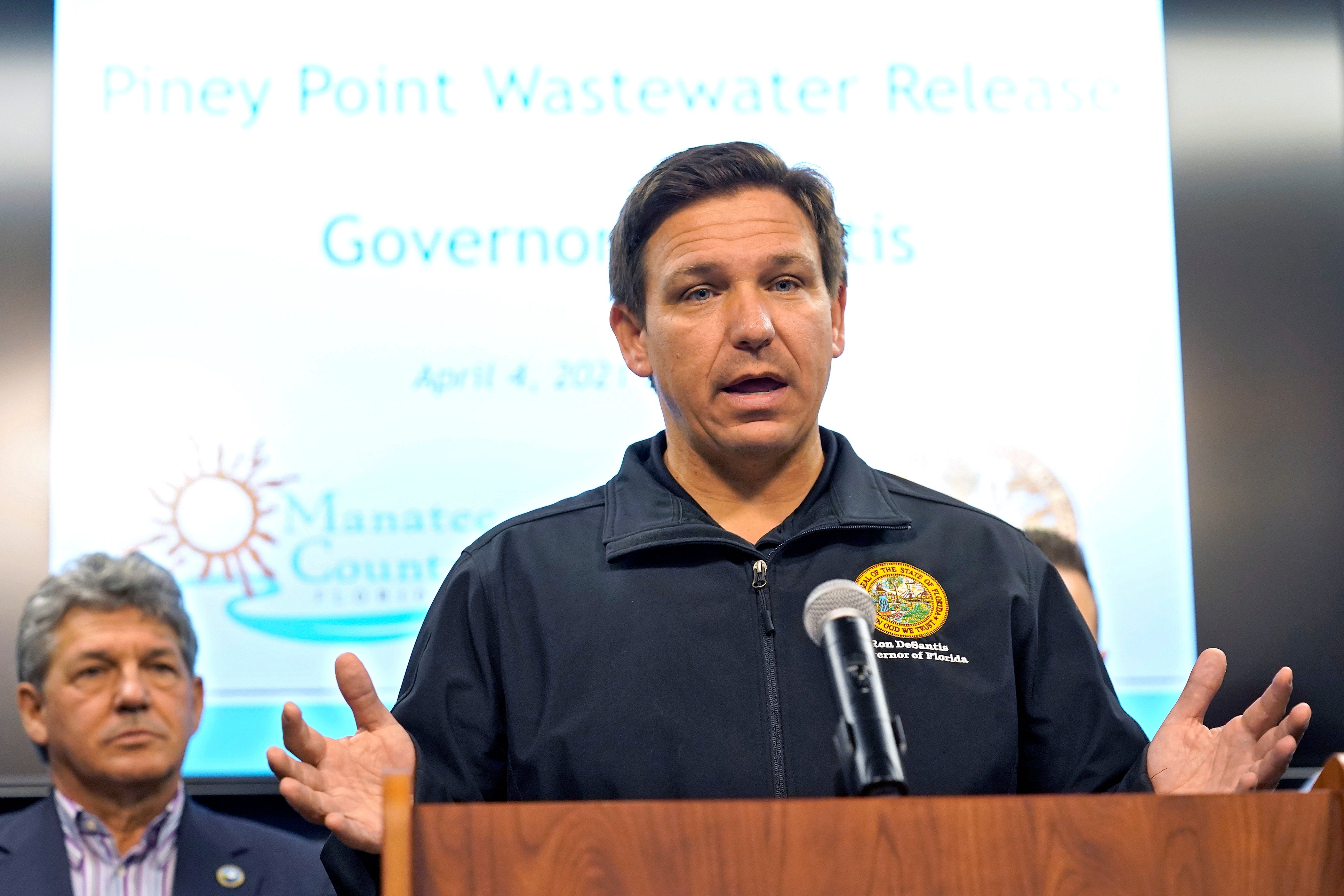Florida governor rebuts vaccine 'pay-to-play' report on CBS
Florida Gov. Ron DeSantis pushed back aggressively against a “60 Minutes” report that suggested he initially made a deal to distribute COVID-19 vaccines in a South Florida county at Publix Super Markets pharmacies after the company made a donation to his political action committee

Your support helps us to tell the story
From reproductive rights to climate change to Big Tech, The Independent is on the ground when the story is developing. Whether it's investigating the financials of Elon Musk's pro-Trump PAC or producing our latest documentary, 'The A Word', which shines a light on the American women fighting for reproductive rights, we know how important it is to parse out the facts from the messaging.
At such a critical moment in US history, we need reporters on the ground. Your donation allows us to keep sending journalists to speak to both sides of the story.
The Independent is trusted by Americans across the entire political spectrum. And unlike many other quality news outlets, we choose not to lock Americans out of our reporting and analysis with paywalls. We believe quality journalism should be available to everyone, paid for by those who can afford it.
Your support makes all the difference.Florida Gov. Ron DeSantis pushed back aggressively Tuesday against a “60 Minutes” report that suggested he initially made a deal to distribute COVID-19 vaccines in a South Florida county at Publix Super Markets pharmacies because the company made a donation to his political action committee.
The Republican governor warned of unspecified “consequences” over the report that aired Sunday night on CBS, which stood behind the story. The report focused on the vaccine rollout in Palm Beach County and also suggested Florida’s vaccine distribution had generally favored the wealthy and well-connected.
“These are smear merchants,” DeSantis said during a news conference in Panama City “They knew what they were doing was a lie.”
The governor said his office had offered people to be interviewed about Florida’s vaccine rollout for the report but the news show declined. He called the “pay-to-play" allegations in the report, “lies built on lies."
CBS said in a statement that “60 Minutes" interviewed dozens of people about the story and requested interviews with DeSantis, who declined, and Florida Division of Emergency Management Director Jared Moskowitz, who declined to be interviewed on camera until after the story's deadline.
“When Florida state data revealed people of color were vaccinated at a much lower rate than their wealthier neighbors, ‘60 Minutes' reported the facts surrounding the vaccine’s rollout, which is controlled by the governor," the CBS statement said. “For over 50 years, the facts reported by ‘60 Minutes' have often stirred debate and prompted strong reactions. Our story Sunday night speaks for itself."
On Monday, Palm Beach County Mayor Dave Kerner, a Democrat, issued a statement that accused “60 Minutes” of using “intentionally false” information in its criticism of DeSantis’ role in the Publix deal. Kerner said DeSantis had met with him and the county administrator before the announcement, and they had asked DeSantis to “expand the state’s partnership with Publix” to the county.
“They had that information, and they left it out because it kneecaps their narrative,” Kerner said of “60 Minutes."
Responding to the mayor’s statement, Palm Beach County Commissioner Melissa McKinlay said in a tweet, “I respect Mayor but this is NOT accurate.” She said county officials never asked that Publix be the sole distributor of the vaccines.
The state announced in January that Publix, the state’s largest supermarket chain, would have sole vaccine distribution rights in Palm Beach County –- a decision that drew criticism from McKinlay and some state legislators because the chain has no outlets within 25 miles (40 kilometers) of the mostly Black poverty-stricken sugar farming communities in a rural corner of the county that abuts Lake Okeechobee.
About 30,000 people live in Belle Glade and other nearby towns, including about 5,000 residents over 65. McKinlay told The Associated Press and other media outlets at the time that she wasn’t opposed to Publix’s involvement in the distribution effort. She just wanted to make sure Belle Glade residents would have easy access to the vaccine, too.
Within a few days, the state said it would set up a drive-up stand in Belle Glade, just as it had done in numerous wealthier communities across the state.
About 17% of Florida residents are Black, but they make up only 6.5% of the 6.4 million who have received at least one vaccine shot, according to the state. Some of that mirrors a national reluctance among some Black communities to get the vaccine because of past incidents like the Tuskegee Syphilis Study where their ancestors were experimented on by doctors.
The “60 Minutes" report said that weeks before the state announced its partnership with Publix, the supermarket chain donated $100,000 to DeSantis' political action committee.
Moskowitz, though, said last month that Publix was picked because its pharmacies were the only ones at the time who were able to execute the vaccine distribution. Since then, other major pharmacy chains have been offering vaccines.
___
AP media writer David Bauder in New York contributed to this report.
___
Follow Mike Schneider on Twitter at https://twitter.com/MikeSchneiderAP
Follow Terry Spencer on Twitter at https://twitter.com/terryspen